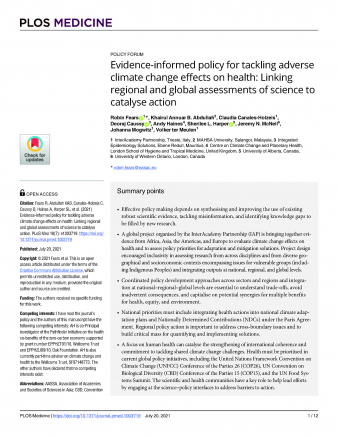- Effective policy making depends on synthesising and improving the use of existing robust scientific evidence, tackling misinformation, and identifying knowledge gaps to be filled by new research.
- A global project organised by the InterAcademy Partnership (IAP) is bringing together evidence from Africa, Asia, the Americas, and Europe to evaluate climate change effects on health and to assess policy priorities for adaptation and mitigation solutions. Project design encouraged inclusivity in assessing research from across disciplines and from diverse geographical and socioeconomic contexts encompassing issues for vulnerable groups (including Indigenous Peoples) and integrating outputs at national, regional, and global levels.
- Coordinated policy development approaches across sectors and regions and integration at national–regional–global levels are essential to understand trade-offs, avoid inadvertent consequences, and capitalise on potential synergies for multiple benefits for health, equity, and environment.
- National priorities must include integrating health actions into national climate adaptation plans and Nationally Determined Contributions (NDCs) under the Paris Agreement. Regional policy action is important to address cross-boundary issues and to build critical mass for quantifying and implementing solutions.
- A focus on human health can catalyse the strengthening of international coherence and commitment to tackling shared climate change challenges. Health must be prioritised in current global policy initiatives, including the United Nations Framework Convention on Climate Change (UNFCC) Conference of the Parties 26 (COP26), UN Convention on Biological Diversity (CBD) Conference of the Parties 15 (COP15), and the UN Food Systems Summit. The scientific and health communities have a key role to help lead efforts by engaging at the science–policy interfaces to address barriers to action.
This article was originally published in PLOS Medicine, a peer-reviewed weekly medical journal covering the full spectrum of the medical sciences. PLOS is a nonprofit, Open Access publisher empowering researchers to accelerate progress in science and medicine by leading a transformation in research communication. The PLOS Medicine Policy Forum section provides a platform for health policymakers from around the world to discuss the challenges and opportunities in improving health care to their constituencies.

